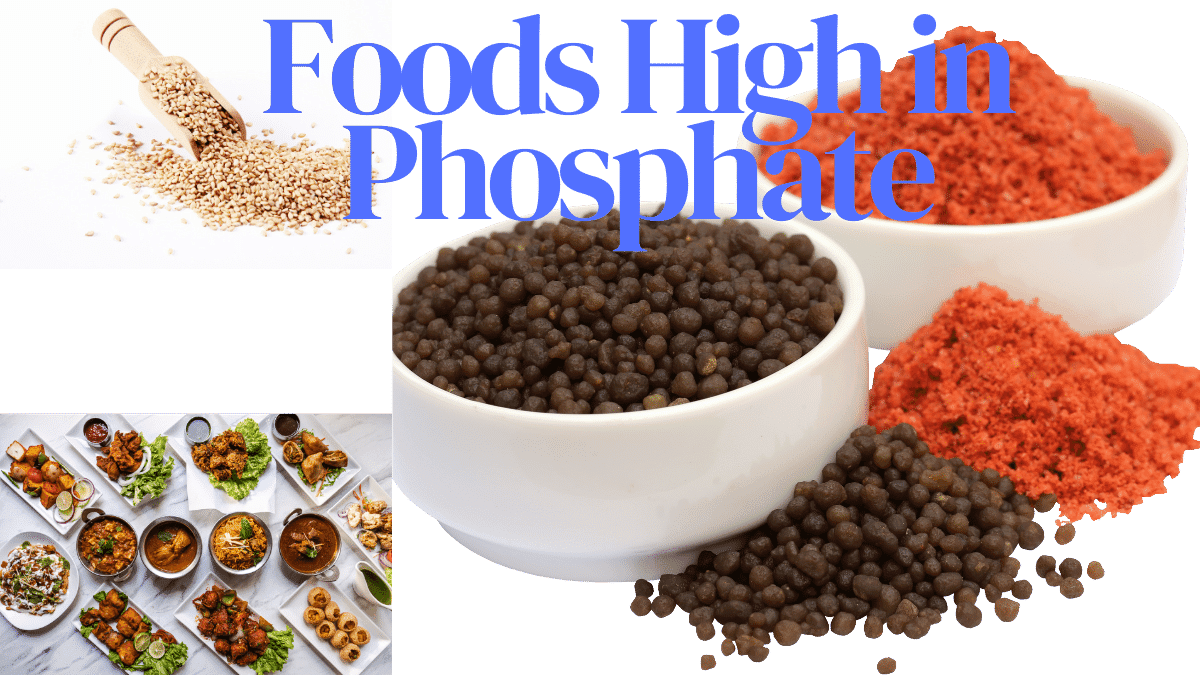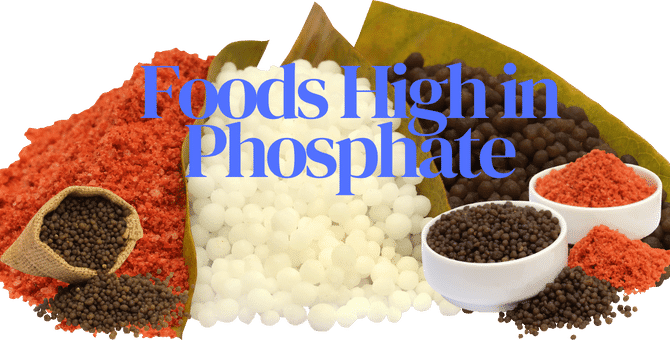FOOD
Foods High in Phosphate


Phosphorus, an essential mineral, plays a crucial role in maintaining overall health. From contributing to bone health to participating in energy production and cell membrane structure, it’s indispensable. However, an excess of phosphorus can lead to health issues, making it vital to be aware of foods high in phosphate.
Introduction
In the realm of nutritional awareness, understanding the impact of different elements on our health is crucial. Phosphorus, a key player in this arena, holds a significant place in our diet. In this article, we’ll delve into the world of “Foods High in Phosphate” to unravel the importance of this mineral and its implications for our well-being.
What is Phosphate?
Phosphate, in its various forms, is a vital component in the body. From forming the backbone of DNA to aiding in energy transfer, it’s involved in numerous physiological processes. Before we explore the foods rich in phosphate, let’s understand the basics of this essential mineral.
Importance of Phosphate in Diet
Contribution to Bone Health
One of the primary roles of phosphate is its contribution to bone health. It works in tandem with calcium, forming the sturdy structure that supports our bodies.
Involvement in Energy Production
Phosphate is a key player in energy production, participating in ATP (adenosine triphosphate) synthesis, the body’s energy currency.
Role in Cell Membrane Structure
Beyond bones and energy, phosphate is integral to the structure of cell membranes, influencing cellular functions.
Foods High in Phosphate
Dairy Products
Dairy items like milk, cheese, and yogurt are rich sources of phosphate. While they offer essential nutrients, moderation is key.
Meat and Poultry
Meat and poultry, especially organ meats, contain significant amounts of phosphate. Balancing meat consumption is essential for a well-rounded diet.


Seafood
Fish and shellfish are excellent sources of phosphorus. Including them in your diet provides essential nutrients, but mindful consumption is advised.
Nuts and Seeds
Certain nuts and seeds, such as almonds and sunflower seeds, are high in phosphate. Enjoy them as part of a balanced diet.
Grains and Cereals
Whole grains and cereals contribute to dietary phosphate. Incorporate them wisely to maintain a nutrient-rich diet.
Processed Foods
Many processed foods, including sodas, snacks, and ready-to-eat meals, contain added phosphate. Being aware of these sources is crucial for overall health.
Phosphate Levels in Beverages
Carbonated Drinks
Carbonated drinks often contain phosphoric acid, elevating their phosphate content. Limiting their consumption is advisable for maintaining a balanced diet.
Alcoholic Beverages
Certain alcoholic beverages may also contribute to phosphate intake. Moderation is key, and awareness of their phosphorus content is essential.
Impact on Overall Phosphate Intake
Considering the cumulative effect of beverage consumption on daily phosphate levels is crucial for dietary balance.
Recommended Phosphate Intake
Daily Recommended Values
Understanding the recommended daily intake of phosphate helps in making informed dietary choices.
Adjusting Phosphate Intake Based on Health Conditions
Individuals with specific health conditions may need to adjust their phosphate intake. Consulting healthcare professionals is essential for personalized guidance.
Health Implications of High Phosphate Intake
Kidney Health Concerns
Excessive phosphate intake can pose risks to kidney health. Monitoring and managing phosphate levels is vital, especially for those with kidney issues.
Cardiovascular Risks
High phosphate levels are linked to cardiovascular risks. Adopting a phosphate-conscious diet can contribute to heart health.
Impact on Bone Health
While phosphate is crucial for bones, an imbalance can negatively affect bone health. Striking the right balance is key for overall well-being.
Balancing Phosphate Intake
Incorporating Low-Phosphate Foods
Including low-phosphate foods in your diet, such as fruits and vegetables, helps maintain balance.
Monitoring Phosphate Levels in Processed Foods
Being vigilant about the phosphate content in processed foods aids in making informed choices for a healthier lifestyle.
Importance of a Well-Balanced Diet
Emphasizing the significance of a well-balanced diet for overall health and avoiding excessive phosphate intake.
Phosphate and Specific Diets
Phosphate Content in Vegetarian Diets
Even in vegetarian diets, phosphate is present in certain foods. Understanding these sources helps in planning a balanced vegetarian diet.
Addressing Phosphate Concerns in Special Diets
Individuals on special diets need to pay attention to phosphate content. Customizing dietary choices ensures meeting nutritional needs.
Cooking Methods and Phosphate Retention
Influence of Cooking Methods on Phosphate Levels
Cooking methods can influence phosphate levels in foods. Opting for cooking techniques that minimize phosphate retention is beneficial.
Tips for Reducing Phosphate in Cooked Foods
Simple tips, such as using fresh ingredients and minimizing the use of phosphate-containing additives, help in reducing phosphate levels in cooked meals.
Phosphate in Fast Foods
Awareness of Phosphate Content in Fast Food Items
Fast foods often contain high levels of phosphate. Making conscious choices while dining out contributes to a healthier lifestyle.
Making Informed Choices While Dining Out
Being mindful of the phosphate content in fast food items empowers individuals to make healthier choices while enjoying occasional treats.
Labels and Phosphate Content
Understanding Food Labels for Phosphate Information
Reading food labels is essential for identifying phosphate content in packaged foods. It aids in making informed decisions about dietary choices.
Hidden Sources of Phosphate in Packaged Foods
Certain packaged foods may have hidden sources of phosphate. Being aware of these sources prevents unintentional overconsumption.
Myths and Facts About Phosphate
Dispelling Common Misconceptions
Addressing common myths about phosphate helps in promoting accurate information for informed decision-making.
Providing Accurate Information on Phosphate
Offering factual information about phosphate, debunking myths, and promoting understanding for a well-informed audience.
Incorporating a Phosphate-Aware Diet
Practical Tips for Reducing Phosphate Intake
Providing practical tips for individuals to reduce phosphate intake in their daily lives, fostering a balanced and healthy diet.
Importance of Consulting with Healthcare Professionals
Emphasizing the role of healthcare professionals in guiding individuals with specific health concerns or dietary restrictions related to phosphate.
Conclusion
In conclusion, understanding the significance of phosphate in our diet is essential for maintaining optimal health. While it plays vital roles in various bodily functions, being mindful of foods high in phosphate is key to preventing health issues. Striking a balance, incorporating a variety of nutrient-dense foods, and staying informed contribute to a healthier lifestyle.
FAQs
- Is all phosphorus in food bad for health?
- No, phosphorus is essential for various bodily functions, but excessive intake, especially from processed foods, can have health implications.
- Can I get enough phosphate from a vegetarian diet?
- Yes, certain plant-based foods contain phosphate, and a well-balanced vegetarian diet can provide adequate levels.
- How does phosphate affect kidney health?
- Excessive phosphate can strain the kidneys, potentially leading to kidney-related issues over time.
- Are there phosphate-free alternatives to processed foods?
- While it’s challenging to find entirely phosphate-free alternatives, choosing minimally processed foods can significantly reduce phosphate intake.
- Is it necessary to monitor phosphate intake if I’m healthy?
- Yes, maintaining awareness of phosphate intake is beneficial for overall health, even for those without specific health concerns.

